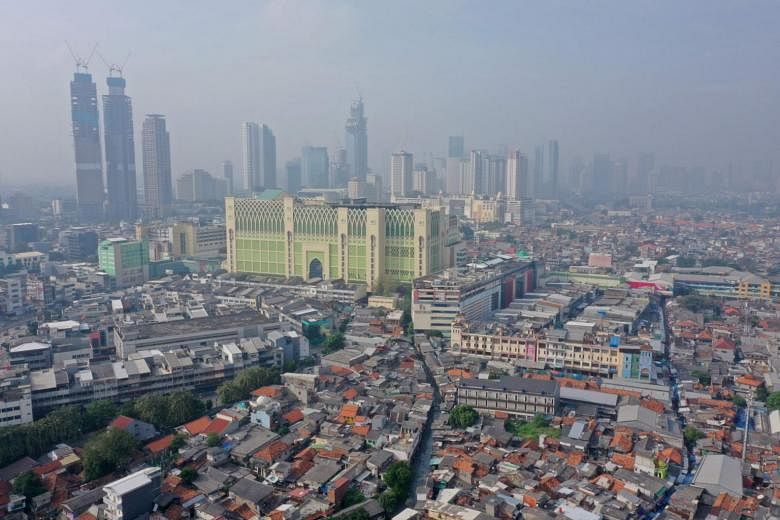JAKARTA - Indonesia's economy contracted by 5.32 per cent in the second quarter compared to a year ago, its first negative growth in 21 years.
The contraction was led by two sectors - the transportation and logistics, and hotel, foods and beverages - as overall demand all but disappeared due to the ongoing coronavirus pandemic and partial lockdowns imposed in capital Jakarta and around the country.
South-east Asia's biggest economy expanded by 2.97 per cent year-on-year in the first quarter. The economy had been expected to shrink 4.61 per cent, according to a Reuters poll of economists.
Indonesia's National Statistics Agency (BPS) announced on Wednesday (Aug 5) that the April to June performance was the worst quarter since the first quarter of 1999, when the country shrank by 6.13 per cent due to lingering effect from the 1997/1998 Asian financial crisis.
The transportation and logistics sector shrank by 31 per cent in the second quarter, compared to the same period a year ago. The hotel, foods and beverages sector contracted by 22 per cent, according to BPS.
Indonesia reported its first infection Covid-19 cases in early March and in the following month, cities and provinces started to impose what they call large-scale social distancing measures (PSBB) - equivalent to a partial lockdown.
The PSBB drastically reduced train and bus services, practically banned intercity travel, while restaurants and food outlets severely restricted their businesses.
In June, Jakarta and scores of other regions in the country started to lift part of the restrictions, including allowing restaurants to reopen and use up to a half of the seat capacity and letting workers go to the office on alternate days and work on a staggered schedule, to avoid crowding in lifts.
Frequently used as gauge for consumer demand, the sales of motorcycles, cars and cement saw significant declines in the second quarter, BPS said.
The shipment of motorcycles from manufacturers to dealerships fell by 80 per cent year on year in the second quarter to 313,625 units.
In the same period, sales of cars fell by 89 per cent to 24,042, and the production of cement dropped by 9 per cent.
Foreign tourist arrivals in the second quarter plunged by 88 per cent to 482,650 during the same period, compared to April to June of last year.
"We noticed a pick-up in buying power in July, but compared to the year earlier period, it was still way weaker," head of BPS Mr Kecuk Suhariyanto said, in a hint that things may have improved in the third quarter.
"Let us hope the second quarter be the only quarter with a negative growth," Mr Kecuk said.
The Joko Widodo administration is putting in efforts to avoid a recession, usually indicated by two consecutive quarters of negative growth, by driving more social aid spending such as grants and subsidised loans in the third quarter.
The effort, however, has been partially hampered by the country's weak data base system that could ensure funds would reach eligible recipients quickly.
Indonesian bureaucrats have also been slow to disburse the funds for fear of being wrongly accused of embezzling government funds.
Earlier this week, Mr Joko for the second time expressed his disappointment in his Cabinet over the slow disbursement of the social aids as part of the country's Covid-19 response.
Mr Joko said that only about 20 per cent of the 695 trillion rupiah (S$65 billion) allocated funds have been disbursed.












